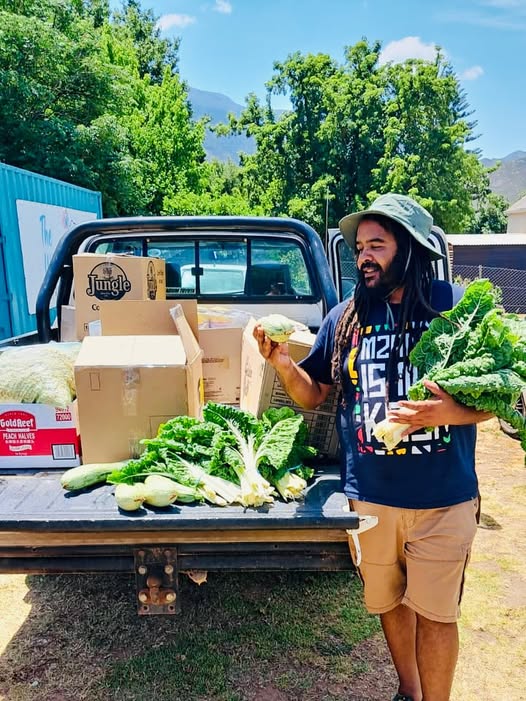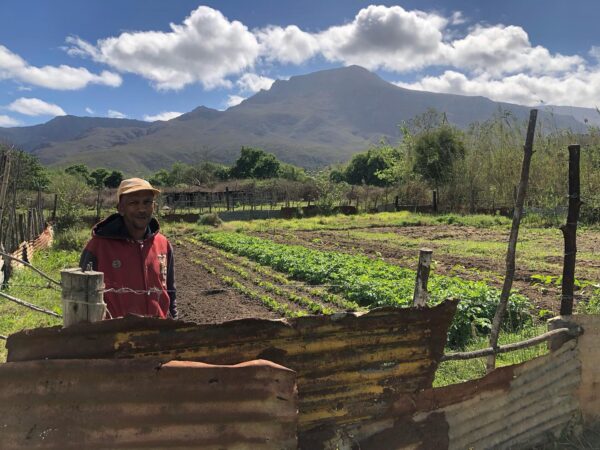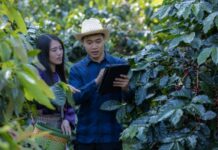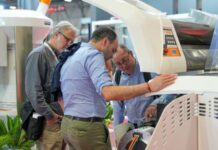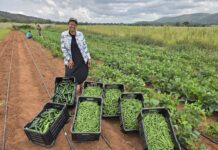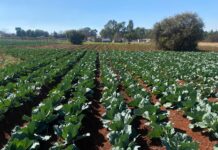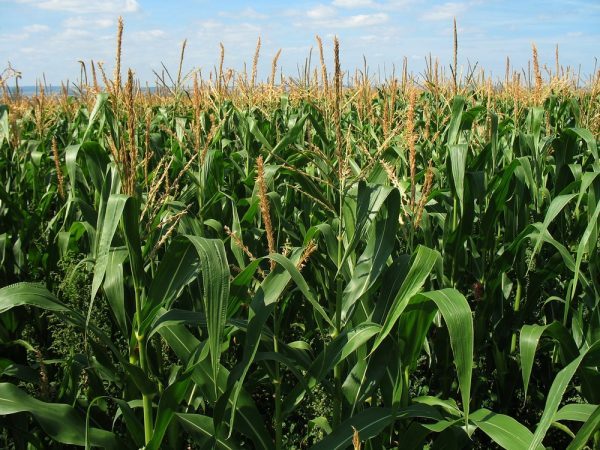South Africa faces deeply entrenched challenges related to poverty, public health, and environmental stability, issues often exacerbated by informal, unregulated farming practices. The innovative ‘Pigs to Plants’ programme, pioneered by Greyton Farm Animal Sanctuary (GFAS), offers a powerful model for transformation – replacing high-risk animal husbandry with profitable, sustainable vegetable farming. This shift, focused on empowering smallholder farmers through agroecology, deserves national support to unleash its potential to alleviate food insecurity, create sustainable jobs, and improve public health across South Africa.
The Problem: Fragile Livelihoods and Compromised Health
Informal pig farming is prevalent in South Africa, accounting for half of the estimated 1.3 million pigs in the country, yet it is fraught with severe concerns. Pigs are frequently kept in inadequate, inhumane conditions, often in spaces smaller than the minimum standards set by the Department of Agriculture, suffering from poor sanitation and limited access to fresh water, proper feed, and veterinary care. Post-mortem analysis on rescued animals has revealed diseases such as encephalitis, hepatitis, and heavy parasite loads.
These compromised practices pose significant public health risks, firstly by direct exposure to the animals and their environment, followed by the resulting products being consumed by communities already struggling with high rates of chronic conditions, including diabetes, hypertension, and respiratory failure. Furthermore, the lack of regulated waste disposal leads to pollution of water sources and soil, impacting surrounding ecosystems. The issue is compounded by a lack of regulation, despite the government supporting these operations by supplying antibiotics and feed, which contributes to antimicrobial resistance, a deadly threat, especially in vulnerable communities. The process of slaughter itself is often barbaric, involving stabbing or strangulation, and is carried out in full view of neighbours and children, causing trauma and contributing to social conflict.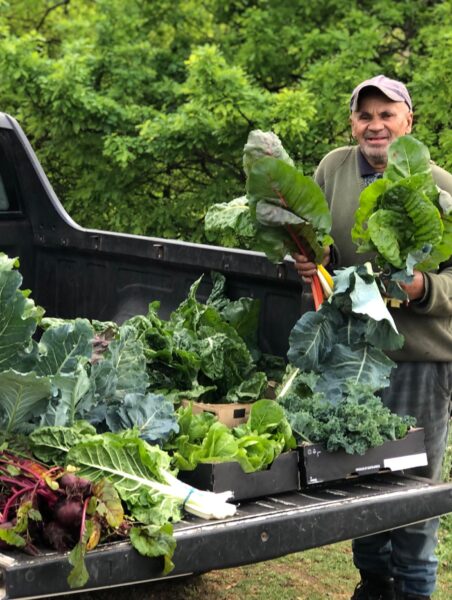
Additionally, the underlying challenge transcends animal welfare; it centres on fragile livelihoods, limited access to land and resources, and the desperate search for sustainable food security in the face of poverty and inequality.
The Solution: The Power of Plants
The inspiration for the ‘Pigs to Plants’ project sprang out of the sanctuary’s humane education programme, delivered by the sanctuary outreach programme manager, Marshall Rinquest. As children’s natural empathy started to find expression they became aware of the suffering of animals in their community, particularly pigs. Marshall’s own seven-year-old son, Chezideck, often asked about the “horrible” conditions of the muddy, confined pig sites he walked past daily. Rinquest recognised the need to offer informal pig farmers another option: a cleaner, more sustainable way to earn money that families could participate in.
The GFAS model provides informal farmers with the opportunity to transition from livestock to sustainable plant farming, offering a deal: surrender their pigs (which are re-homed at the sanctuary) in exchange for a complete vegetable-growing set-up valued between R50,000 and R70,000. This funding includes a water tank, irrigation, fencing (which has to be strong to keep neighbouring animals out), shadecloth area, seeds, labour (if the farmer is disabled, elderly or just needs some support) and is primarily secured through international NGOs. GFAS founder Nicola Vernon recounts that establishing the project required two “very difficult years of sheer perseverance” before the first farmer came on board.
The project’s success, however, quickly became contagious. The farmers value the daily convenience of harvesting food from their gardens, the opportunity to bring their children into the garden, and the steady income that replaces the irregular earnings from slaughtering a pig only every few months.
Over six years, 14 of the approximately 90 pig farmers in the Genadendal and Greyton regions have successfully made the switch, with expansion underway in nearby towns like Napier, where 3 farmers successfully switched. The success is driven not only by ethics but by economics.
Economic and Health Transformations
The transition to agroecological smallholder farming creates deep and lasting benefits for communities:
- Sustainable Income and Job Creation:The converted spaces become thriving market gardens, which produce a range of in-demand fresh fruit and vegetables. The local demand is high, particularly from more affluent residents who seek locally grown, organic produce, allowing the farmers to command a good price. The addition of brandinglike ‘The Graceful Garden’ adds value via minimum agri processing of products from the gardens into pestos, chutneys, sauces, preserves as well as veggie boxes, salad and soup packs, enhancing income and working towards self-sustainability. The goal is for the programme to become self-funding within a couple of years. Embedding circular-economy principles strengthens this model even further, ensuring that resources stay within the community, for example, composting garden waste, reusing water where possible, and reinvesting profits back into local production. This closed-loop approach reduces costs, minimises waste, and builds long-term economic resilience. Worth mentioning is Paul Gray (67) from the Napier group ‘Gardens of Hope’, along with his team of unemployed men, who have been working for nearly a year without pay but are sustained by the fresh vegetables they grow. Paul is now setting up a market in Napier so the men can also begin earning an income from their produce.
- Enhanced Food Security and Public Health:The gardens provide the “best version of food security”. Access to fresh, nutritious food directly addresses diet-related illnesses prevalent in vulnerable communities. Farmers with insufficient land are allocated gardens owned by schools, churches and clinics, and the surplus produce from these gardens is already being utilised in pilot feeding programmes to enhance the government’s National School Nutrition Programme (NSNP), which currently provides “low quality, bland meals”. By supplementing school feeding schemes with fresh vegetables and herbs harvested from local, organic gardens, the project demonstrates that locally grown food can provide tasty and wholesome meals necessary for children to thrive.

- Community and Environmental Improvement:Making the swap improves the environment, provides food security, and reduces community trauma by eliminating the public slaughter of animals.
As Vernon notes, farmers go “from zero to hero in their communities” through their efforts.
The model has gained even more traction following recent environmental shocks, such as the African swine fever outbreak in Bredasdorp, which wiped out all 1,200 of the town’s informally farmed pigs before spreading to Napier, where over 200 pigs were lost. This created a unique opportunity to encourage now pigless owners to transition to a plant-based income.
Advocating for a National Policy Shift
The GFAS project aims to scale up and offer the opportunity to other municipal areas, with collaborations already underway with Overstrand Municipality (stretching from Pringle Bay to Agulhas, including Kleinmond, Hermanus and Gansbaai). To achieve widespread impact, the programme advocates for a crucial national policy shift: redirecting subsidies from low-welfare pig production to community-driven vegetable, fruit, and crop production.
This redirection would enable the successful model to be rolled out to other towns with the help of the Department of Agriculture, formalising and funding this sustainable transition.
This model is not just a localised success story; it offers a blueprint for developing nations worldwide where backyard animal farming, often mistaken for a lifeline, actually causes environmental degradation, animal suffering, and compromised human health. Embracing the ‘Pigs to Plants’ transfarmation is an economic, ethical, and environmental imperative for a healthier, more prosperous South Africa
If you would like to learn more, or would like to apply to participate, please reach out to:
nicola@greytonfarmsanctuary.org or marshallrinquest@gmail.com
Sources:
- https://greytonfarmsanctuary.org/pigs-to-plants/
- https://greytonfarmsanctuary.org/2020/08/pigs-to-plants/
- https://www.safsc.org.za/food-commons-projects/valley-food-gardens-a-local-movement-supported-by-greyton-transition-town/
- https://www.financialmail.businessday.co.za/news-and-fox/2025-11-13-the-big-township-swap-your-pigs-for-our-garden/
- https://www.facebook.com/greytonfarmanimalsanctuary/posts/marshall-rinquest-and-norah-hudson-presenting-the-pigs-to-plants-programme-in-ca/1084520287182147/


